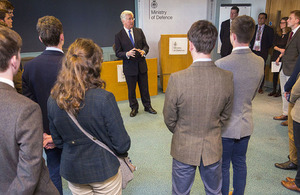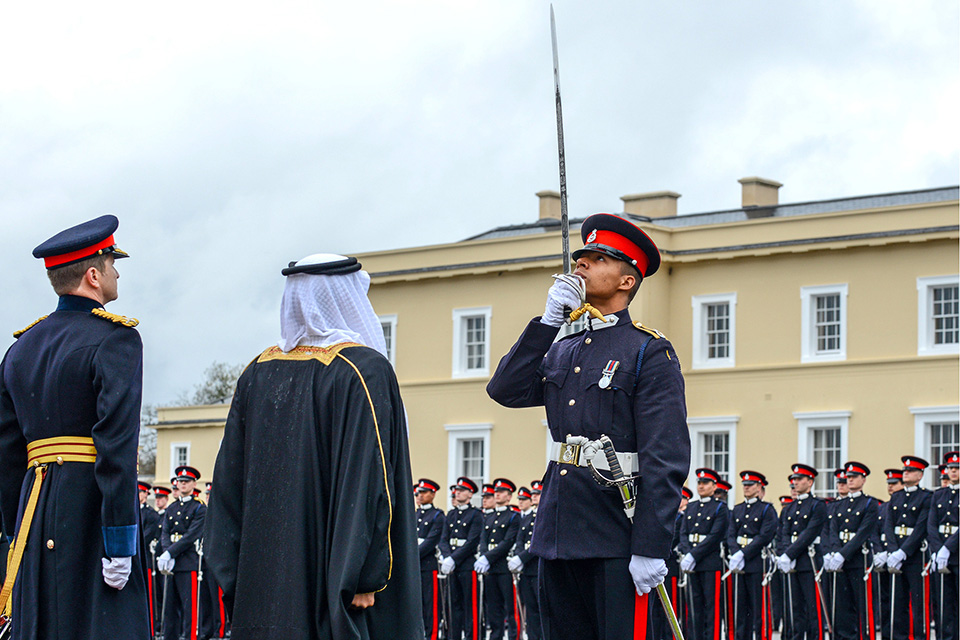30% of officers progress from the ranks
Addressing a group of would-be officers yesterday, Defence Secretary Sir Michael Fallon revealed that nearly a third of serving officers have progressed from the lower ranks.

Addressing a group of would-be officers, Defence Secretary Sir Michael Fallon today revealed that nearly a third of serving officers have progressed from the lower ranks. Crown Copyright.
Defence Secretary, Sir Michael Fallon has revealed figures showing that almost 30% of officers in the Armed Forces progressed from the lower military ranks, as he met would-be officers at the Ministry of Defence’s London HQ yesterday.
Across the Armed Forces, nearly a third of serving officers - a third of Army officers, a fifth of Royal Navy officers, and a quarter of RAF officers - commissioned having not joined at that level. Instead, over 1800 serving officers over a five year period have taken the development opportunities available to them in the military to reach their full potential at that rank later in their career.
The Defence Secretary spoke with students in week nine of the Potential Officer Development Programme (PODP), a 12 week intensive course which runs three times a year, aimed at catapulting soldiers from diverse backgrounds into the officer ranks.
He said:
The Armed Forces offer opportunities for everyone to reach their full potential, whatever their background. We are encouraging people to aim higher and teaching them valuable skills required to become tomorrow’s officers.
The PODP is designed to develop communications skills, knowledge of international affairs and cultural horizons, with the ultimate goal of getting students to qualify through the Royal Military Academy Sandhurst as officers in the Army. Amongst those to have already benefitted from the military’s commitment to social mobility are nearly 500 former graduates of the PODP.
Becoming an Army Officer was just the start of the story for PODP graduate Kidane Cousland, who has praised the programme as “crucial to success”.
Kidane was awarded last year’s Sandhurst Sword of Honour for being considered the best cadet on his course at Sandhurst, and he says he was able to achieve the “impossible” thanks to the PODP scheme.
The Tottenham-born 25 year-old joined the Army in 2007 with four GCSEs, having had to retake three of them in college. Unable to read until the age of 12, he had written off his academic ability - until someone in his regiment spotted his potential leadership skills and sent him on the PODP.
Now a Second Lieutenant serving with the Royal Artillery, Kidane said:
The Potential Officer Development Programme gave me confidence in my ability and was crucial to my success. Without a high level of performance in the academic aspects at Sandhurst I would not have been a contender for the Sword of Honour. It’s an achievement that I thought would be impossible before the Potential Officer Development Programme.

Second Lieutenant Cousland was awarded the Sword of Honour at the Royal Military Academy Sandhurst. Crown Copyright.
Like Second Lieutenant Cousland, the majority of those who go through PODP do not hold a degree, but regularly go on to perform well at Sandhurst – a prestigious institution which traditionally draws on university graduates and the brightest cadets from the UK and abroad.
The Chief of the General Staff, General Sir Nick Carter, said:
The Army is a modern, inclusive employer and I want every recruit to be given the opportunity to fulfil their potential. Second Lieutenant Cousland is a tremendous example of how schemes like this can give those who don’t have the best possible start in life a leg up, while helping us maximise the talent of everyone in the Army.
Potential Officer Chloe Rhodes, 27 from Lancashire, who met the Defence Secretary in London, will be hoping to follow in Second Lieutenant Cousland’s footsteps. Having joined the Army in 2006 as part of the Royal Electrical and Mechanical Engineers, working on Apache Attack helicopters which were being deployed in Libya and Afghanistan, she is now enrolled on the PODP and is looking ahead to the Army Officer Selection Board in May.
She said:
The Army has given me the opportunity to complete many qualifications whilst in full time employment, including an advanced apprenticeship in electrical engineering and management qualifications. I have also travelled to 10 different countries over the last decade for various exercises and deployments, broadening my cultural awareness and life experience.
While Sandhurst has long been recognised as one of the most famous academies in the world, the Armed Forces has a host of other successful education initiatives aimed at being a vehicle for social mobility, including:
- Being the largest apprenticeship provider in the whole of the UK, with around 7,500 completed each year;
- Offering literacy, numeracy and a whole range of academic support to serving personnel;
- Offering learning credits where appropriate which can be redeemed against civilian qualifications up to PhD level.